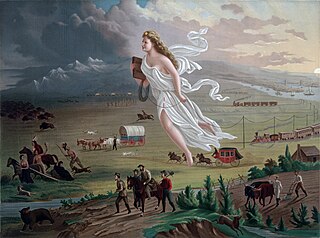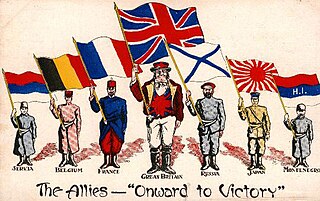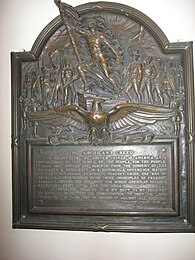
Patriotism is the feeling of love, devotion, and a sense of attachment to a country or state. This attachment can be a combination of different feelings for things such as the language of one's homeland, and its ethnic, cultural, political, or historical aspects. It may encompass a set of concepts closely related to nationalism, mostly civic nationalism and sometimes cultural nationalism.
Secular humanism is a philosophy, belief system, or life stance that embraces human reason, logic, secular ethics, and philosophical naturalism, while specifically rejecting religious dogma, supernaturalism, and superstition as the basis of morality and decision-making.

The Equal Rights Amendment (ERA) is a proposed amendment to the United States Constitution that would, if added, explicitly prohibit sex discrimination. It was written by Alice Paul and Crystal Eastman and first introduced in Congress in December 1923. With the rise of the women's movement in the United States during the 1960s, the ERA garnered increasing support, and, after being reintroduced by Representative Martha Griffiths in 1971, it was approved by the U.S. House of Representatives that year, and by the U.S. Senate in 1972, thus submitting the ERA to the state legislatures for ratification, as provided by Article V of the U.S. Constitution. The amendment's ratification in the states remains disputed to today, and it remains unratified.
Brown v. Board of Education of Topeka, 347 U.S. 483 (1954), was a landmark decision of the U.S. Supreme Court that ruled that U.S. state laws establishing racial segregation in public schools are unconstitutional, even if the segregated schools are otherwise equal in quality. The decision partially overruled the Court's 1896 decision Plessy v. Ferguson, which had held that racial segregation laws did not violate the U.S. Constitution as long as the facilities for each race were equal in quality, a doctrine that had come to be known as "separate but equal". The Court's unanimous decision in Brown, and its related cases, paved the way for integration and was a major victory of the civil rights movement, and a model for many future impact litigation cases.

"Manifest destiny" is a phrase that represents the belief in the 19th-century United States that American settlers were destined to expand westward across North America, and that this belief was both obvious ("manifest") and certain ("destiny"). The belief is rooted in American exceptionalism and Romantic nationalism, implying the inevitable spread of the Republican form of governance. It is one of the earliest expressions of American imperialism in the United States of America.
Identity politics is politics based on a particular identity, such as ethnicity, race, nationality, religion, denomination, gender, sexual orientation, social background, caste, age, disability, intelligence, and social class. The term encompasses various often-populist political phenomena and rhetoric, such as governmental migration policies that regulate mobility and opportunity based on identities, left-wing agendas involving intersectional politics or class reductionism, and right-wing nationalist agendas of exclusion of national or ethnic "others."
Equal opportunity is a state of fairness in which individuals are treated similarly, unhampered by artificial barriers, prejudices, or preferences, except when particular distinctions can be explicitly justified. For example, the intent of equal employment opportunity is that the important jobs in an organization should go to the people who are most qualified – persons most likely to perform ably in a given task – and not go to persons for reasons deemed arbitrary or irrelevant, such as circumstances of birth, upbringing, having well-connected relatives or friends, religion, sex, ethnicity, race, caste, or involuntary personal attributes such as disability, age.

The Independent Order of Odd Fellows (IOOF) is a non-political, non-sectarian international fraternal order of Odd Fellowship. It was founded in 1819 by Thomas Wildey in Baltimore, Maryland, United States. Evolving from the Order of Odd Fellows founded in England during the 18th century, the IOOF was originally chartered by the Independent Order of Oddfellows Manchester Unity in England but has operated as an independent organization since 1842, although it maintains an inter-fraternal relationship with the English Order. The order is also known as the Triple Link Fraternity, referring to the order's "Triple Links" symbol, alluding to its motto "Friendship, Love and Truth".

The Social Contract, originally published as On the Social Contract; or, Principles of Political Right, is a 1762 French-language book by the Genevan philosopher Jean-Jacques Rousseau. The book theorizes about how to establish legitimate authority in a political community, that is, one compatible with individual freedom, in the face of the problems of commercial society, which Rousseau had already identified in his Discourse on Inequality (1755).

National identity is a person's identity or sense of belonging to one or more states or one or more nations. It is the sense of "a nation as a cohesive whole, as represented by distinctive traditions, culture, and language".
The New International Economic Order (NIEO) is a set of proposals advocated by developing countries to end economic colonialism and dependency through a new interdependent economy. The main NIEO document recognized that the current international economic order "was established at a time when most of the developing countries did not even exist as independent states and which perpetuates inequality." In the spirit of "trade not aid," the NIEO called for changes in trade, industrialization, agricultural production, finance, and transfer of technology. The United Nations General Assembly adopted the "Declaration for the Establishment of a New International Economic Order" and its accompanying program of action on 1 May 1974.

William Tyler Page was an American public servant. He worked on the United States Capitol in Washington, D.C., for 61 years, first as a page boy and later as a clerk of the United States House of Representatives. He was the author of American Creed and Story of Nation’s Capital.

The legal status of Hawaii is an evolving legal matter as it pertains to United States law. The US Federal law was amended in 1993 with the Apology Resolution which "acknowledges that the overthrow of the Kingdom of Hawaii occurred with the active participation of agents and citizens of the United States and further acknowledges that the Native Hawaiian people never directly relinquished to the United States their claims to their inherent sovereignty as a people over their national lands."

The Rifleman's Creed is a part of basic United States Marine Corps doctrine. Major General William H. Rupertus wrote it during World War II following the attack on Pearl Harbor between late 1941 and early 1942, but its first publication was in San Diego in the Marine Corps Chevron on March 14, 1942. His reasoning for writing the Creed is believed to be that he felt that his men had to understand the concept "that the only weapon which stands between them and Death is the rifle...they must understand that their rifle is their life..."
The Preamble to the Constitution of India is based on the Objectives Resolution, which was moved in the Constituent Assembly by Jawaharlal Nehru on 13 December 1946 accepted on 22 January 1947 and adopted by the Constituent Assembly on 26 November 1949, coming into force on 26 January 1950, celebrated as the Republic Day of India, and was initially drafted by Jawaharlal Nehru. The words "socialist", "secular" and "integrity" were later added during the Indian emergency by Indira Gandhi.
In the demography of the United States, some people self-identify their ancestral origin or descent as "American", rather than the more common officially recognized racial and ethnic groups that make up the bulk of the American people. The majority of these respondents are visibly white and do not identify with their ancestral European ethnic origins. The latter response is attributed to a multitude of generational distance from ancestral lineages, and these tend to be Anglo-Americans of English, Scots-Irish, Welsh, Scottish or other British ancestries, as demographers have observed that those ancestries tend to be recently undercounted in U.S. Census Bureau American Community Survey ancestry self-reporting estimates.
A sovereign state is a state that has the supreme sovereignty or ultimate authority over a territory. It is commonly understood that a sovereign state is independent. When referring to a specific polity, the term "country" may also refer to a constituent country, or a dependent territory.

Anti-racism encompasses a range of ideas and political actions which are meant to counter racial prejudice, systemic racism, and the oppression of specific racial groups. Anti-racism is usually structured around conscious efforts and deliberate actions which are intended to create equal opportunities for all people on both an individual and a systemic level. As a philosophy, it can be engaged in by the acknowledgment of personal privileges, confronting acts as well as systems of racial discrimination and/or working to change personal racial biases. Major contemporary anti-racism efforts include the Black Lives Matter movement and workplace anti-racism.

The Equality Act was a bill in the United States Congress, that, if passed, would amend the Civil Rights Act of 1964 to prohibit discrimination on the basis of sex, sexual orientation and gender identity in employment, housing, public accommodations, education, federally funded programs, credit, and jury service. The Supreme Court's June 2020 ruling in Bostock v. Clayton County protects gay and transgender people in matters of employment, but not in other respects. The Bostock ruling also covered the Altitude Express and Harris Funeral Homes cases.

Canadian values are the commonly shared ethical and human values of Canadians. The major political parties generally claim explicitly that they uphold these values, but there are no consensus among them about what they are and follow a value pluralism approach.











